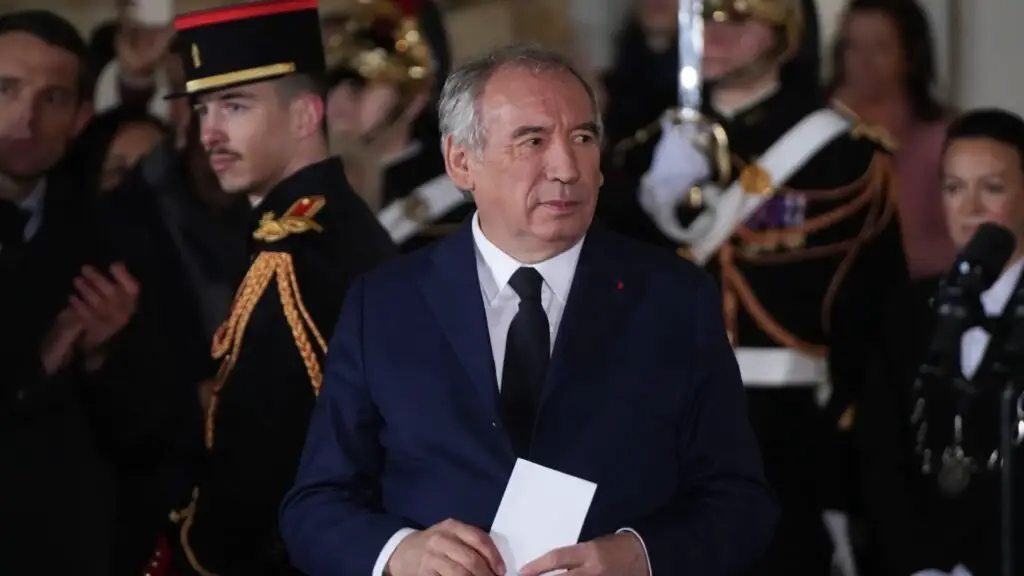Francois Bayrou, France’s new Prime Minister, during the handover ceremony at the Hotel Matignon in Paris, France, on Friday, December 13, 2024.
Bloomberg | Bloomberg | Getty Images
Just a few hours after his appointment, France’s new Prime Minister Francois Bayrou experienced his first surprise: the country’s credit rating was downgraded by the rating agency Moody’s.
The agency announced this on Saturday Lowering France’s rating from “Aa2” to “Aa3” with a stable outlook, citing concerns about “political fragmentation”.
Paris is in the middle of a political whirlwind. Disagreements over tax and spending plans led to the last government being toppled after just three months in power.
Moody’s said the divisions would harm attempts to repair France’s budget deficit and debt, adding that the country’s public finances would be “significantly weakened in the coming years.”
“This is because political fragmentation is more likely to hamper meaningful fiscal consolidation… Looking ahead, the likelihood that the next government will sustainably reduce the size of fiscal deficits beyond next year is now very low,” it says a statement from the rating agency.
Traders reacted negatively to the downgrade, including France CAC 40 Down 0.7% Monday morning. Meanwhile, the yield on the country’s benchmark 10-year bond was 3.03%, only slightly below the Greek counterpart’s yield of 3.09%.
At the end of last month, the difference was seen in the yields of French and Greek 10-year government bonds fell to zero as investors demanded the same interest rates to hold French debt as that of historically troubled Greece – showing how much concern there is about political unrest in Greece.
Uncertainty has reigned in France since the summer, when both the left and right political blocs performed well in indecisive parliamentary elections. Nevertheless, French President Emmanuel Macron installed conservative Michel Barnier as prime minister, causing consternation among opposition parties on both sides of the political spectrum.
Barnier’s government proved short-lived, lasting only three months was overthrown by a vote of no confidence at the beginning of December after French lawmakers rejected his government’s 2025 budget plans that included billions of dollars in tax hikes and public spending cuts.
Under pressure to name a successor quickly, Macron named his centrist ally Bayrou as prime minister on Friday.
Bayrou, 73, is the leader of the Democratic Movement party and a centrist political veteran who has pushed for France to tackle its growing debt pile – which will amount to about 112% of gross domestic product in 2024 – and its yawning budget deficit. They are expected to reach 6.1% this year, even before they became problematic.
What are Bayrou’s chances?
Analysts say Bayrou’s longstanding position in French politics could be helpful in renewed attempts to get lawmakers on the far left and far right to agree to a 2025 budget.
Meanwhile, National Assembly members are expected to agree to extend the 2024 budget into 2025 to avoid a shutdown on January 1.
Still, there is no clarity as to whether an agreement will ultimately be reached on next year’s budget, making the new government’s position as fragile as the last.
“The path to securing a 2025 budget is unclear,” Raphael Brun-Aguerre, an economist at JPMorgan, said in a note on Friday.
“Incorporating opposition parties’ demands could be fiscally costly and the degree of fiscal consolidation could thereby be limited next year,” he said in emailed comments.
There is speculation that Bayrou will reach out to parties from the left-wing New Popular Front alliance to prevent another no-confidence motion from being submitted and pave the way for an agreement on the 2025 budget.
“If Bayrou could ‘buy off’ the 66 Socialist MPs (which is far from certain), he would have split the left-wing New Popular Front alliance, which voted last week with Marine Le Pen’s National Rassemblement Party to overthrow Barnier,” he said Mujtaba Rahman, Eurasia Group managing director Europe said in an email.
“With the support of around 20 independents, he could hope to avoid a no-confidence motion or even pass a budget in the normal way once revised tax and spending plans for 2025 are presented in the new year. Any threat of another no-confidence vote in the assembly by the combined forces of the extreme right and the extreme left would have been neutralized or greatly reduced,” Rahman said.
Eurasia Group said its base case assumes Bayrou has only a limited window – a 60% chance – to pass a 2025 budget in the first months of 2025. This would be based on the Barnier budget but changed to appeal to moderates on the left, the consultancy said.





